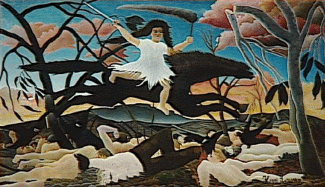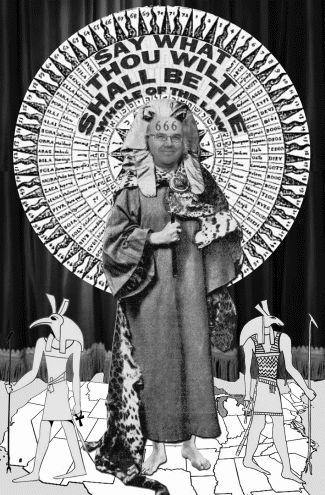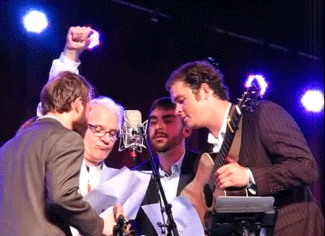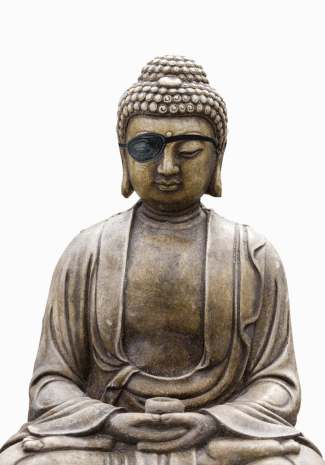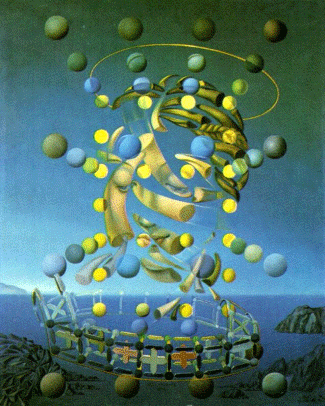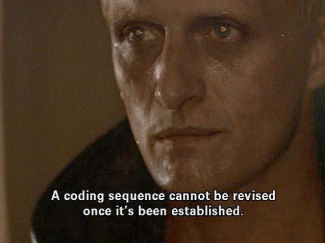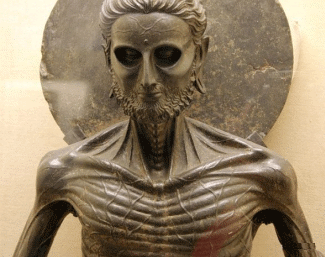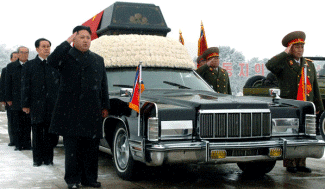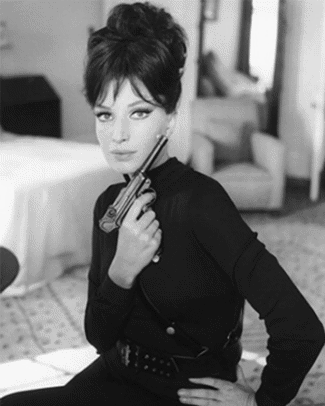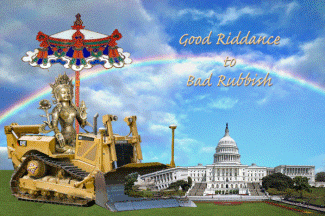How to Be a Happy Familyby Charles Carreon
6/12/14
Intimations of Punk Reality
Hard Questions for Pinheads
Some Ramones fans ask themselves the hard questions. Why do rodents explode when they hear The Ramones played at high volume? Is it true there’s no stopping a Cretin from hopping? Are we friends with the President, friends with the Pope? Are we making a fortune selling daddy’s dope? Are we A Happy Family?
Intimations of PunkI never asked myself these questions until my late twenties, because in those days, I had never heard The Ramones. In 1983, I was twenty-seven, and the airwaves were filled with noxious sounds of bands such as Earth, Wind & Fire and The Village People. Lynyrd Skynyrd was making smart remarks about Southern Man not wantin’ Neil Young around, and I had been listening to the same old hippie tunes so long that I felt like I was married to the Grateful Dead. Years had passed and my boredom and unease had grown deeper. Perhaps, without knowing it, I simply longed to live on A Chinese Rock.
Something in my heart was questing for a harder, more raucous sound that would jar me out of my lost condition, but there was little I, personally, could do. I was living in a tiny town in Oregon, finishing up an English degree after years of hiding out in the woods. I had no time to explore new music. For young people, the college radio station was a pathetic desert dominated by jazz, folk and classical zombies that allowed one four-hour alternative rock show every week.
Through that four-hour window, I heard a new world, a way out of the tedious rhythm of tired contemporary music. One night, the college boys played the whole Talking Heads album, “Stop Making Sense.” I heard David Byrne singing Psycho Killer, stuttering over the f-word and warning us to RUN RUN AWAY, and I knew that my prayers for release from boredom had ended. I fortunately taped the whole album, and blissfully began to live in knew dissonant realms previously unknown to my musical senses.
Law & DisorderSoon thereafter, I moved from Oregon to LA to go to UCLA law school. I rode a shitty beatup Vespa scooter to class that was so ugly the Westwood posers would jeer at me as I went by, like I was making their plastic paradise look crappy. On the music front, the world started opening up. I was on top of the world. I discovered KXLU radio from Loyola Marymount, and started listening to great DJs like Agent Eva, who once did an on-the -air strip-a-thon that left her widely fantasized as being down to a pair of crotchless panties, and raised $2,000 from a bunch of beach scum in a couple of hours. While washing the dishes after school, I could listen to Tex & The Horseheads, REM, X, offbeat characters like John Cale, Lou Reed, etcetera. But still I did not discover the Ramones.
My Discovery of The Ramones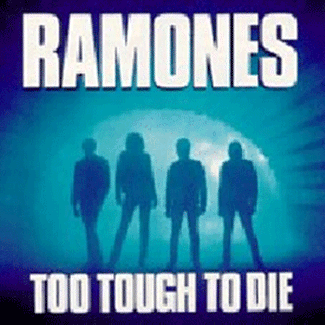
Finally, during Christmas season 1985, with the fateful year of 1984 behind us, I stopped to read a copy of Rolling Stone. (This is something I flirt with every now and then, though lately it is a complete waste of time.) Too Tough To Die had just come out, and it got a five star review in one of those roundups of great rock and roll they do in Rolling Stone on a yearly basis. What really struck me was how long they’d been together. About as long as I’d been married, which was in 1974. I thought anything good that started up at that time and was still going was probably worth checking into, so I went to Rhino Records in Westwood and bought the tape. I stuck it in my Walkman and discovered a power source. My energy had been flagging, because law school is a coercive system that breaks down your will and turns your brain into mush. The entire business of being turned into a mercenary for the system, an oiler for the gigantic smoking mechanism of modern civilization, had left me and most of my law school friends feeling disoriented, if not flat crazy.
The Ramones shattered my prison, burst my chains, and invited me to march down the streets of the metropolis with them, the lords of everything we had thought lost. My dignity restored, a new vision of liberty dawning in my mind, I seized the rude implements of modern life and plunged forward. Into the smog, into the traffic, into the core of the monster, my mind blazing, my stereo cranking, the world cleansed by radiocative sounds. The Ramones accelerated the rhythm of my being until I caught up with the adversary, then ratcheted me into hyperdrive and blasted me far beyond the distant horizon. The song, “I’m Not Afraid of Life” was a great anthem that every city dweller could appreciate.
I’m Not Afraid Of Life
I am not afraid of life
of the poor man’s struggle
of the killer’s knife
I am not afraid of life
of an insane rage
of the minimum wage
I am not afraid of life
I am not afraid of life
I am not afraid of life
But I see an old lady with a shopping bag
and I wonder is life a drag?
I am not afraid of pain
but it hurts so bad
I feel so mad
no one see the truth
there’s nothing to gain
a life goes down the drain
don’t want to die at an early age
I am not afraid of life
I am not afraid of life
But I see a street crazy shivering with cold
is it a crime to be old?
there’s the threat of the nuclear bomb
we know it’s wrong
we know it’s wrong
is there a chance for peace?
will the fighting ever cease?
mankind’s almost out of luck
a maniac could blow us up
I am not afraid of life
I am not afraid of life
but I get down on my knees and I pray
is there hope for the world today ?
Well certainly the madness that afflicts the world, as described in this beautiful song, has not diminished. The Ramones touched on all of the issues that were driving us crazy then, and are still driving us crazy today. Is it a crime to be old? Is life a drag? Is there hope for the world today? Will some maniac blow us up? Are we almost out of luck?
Some People Didn’t Get ItToo Tough To Die, I understand, was deemed to be the first Ramones album that was distinctly politically correct. The Ramones before then had been considered somewhat risky. I mean, how do you really explain “You’re A Loudmouth” in a way that is politically correct? It’s an extremely rude song. “You Don’t Come Close” is so catty. And “Beat on the Brat” is really not all that funny when you think about it. Especially not with a baseball bat, though they make it pretty clear who’s fucked up with the catchy hook — “With a brat like that, what can ya’ lose?” But somehow we have got to laugh, got to stay on top of all the craziness, a step ahead of the rat-race, or we’ll Go Mental! Still, that’s not a good argument for a politically correct culture prude with a hard-on for upstarts from the lower classes.
I Got ItFor me, Too Tough To Die was like a blast of some dark substance that without warning catapulted me down an alleyway, riding in the original Durango 95 that Alex stole in Clockwork Orange, sliding through the darkness between tall buildings, drifting like mercury into the steel arteries of the metropolis, merging into the streaming miles of red tail-lights winding through the hills of LA. I could feel too tough to die, “in real good shape, I have no fear.” I was immediately hooked on the sardonic pose, the irony that works best with the flattest, most deadpan delivery.
I’ve often said you can’t be honest with those who aren’t honest with you. Somebody bullshits you, you have the right to respond honestly, by telling them they’re full of shit. But that generates immediate flak, so we often respond ironically, in a way that means more than either of you will admit. Our society is not honest with us. It puts on a Pepsi face while we are left to deal with flattening social realities — streets, subways, skyscrapers, buses, parking lots, traffic jams, parks as grimy ashtrays, no day care for moms, no medicine for old people, and plenty of guns for every opressor with the brutality to use them. So the Ramones gave us a way of speaking ironically to society. Beat on the Brat sort of says, “Here, try being a nasty brute, a cruel, self-justifying child abuser, and see how that feels.” We can try all kinds of social roles through Ramones songs. In “Time Bomb,” from Subterranean Jungle, the singer is gonna kill his mom and dad, and he won’t be sad about it, ’cause they treated him so bad. He’s a time bomb, baby. This is a sweet way of saying, hey, how likely is it that someone who’s life isn’t all fucked up already would be a time bomb, wanna kill his mom and dad? So you could see the left-wing sentiment in these old songs, but you had to listen to the song first, which I think a lot of politically correct people were not doing. To see how sweet Time Bomb really is, compare it with Danny Elfman’s “Only A Lad,” with its parody of bleeding heart criminal-coddling sentiment, and its nasty aside, “Hey there Johnny boy, I hope you fry!”
Driving Under the Influence of RamonesI soon discovered that, under the influence of Ramones, I found life bearable, and myself capable of answering its demands. The high lasted beyond the listening. A Ramones enlightenment began coming on. Jammin’ down the freeway on my motorcycle, breathing vile exhaust, borne along in a river of gleaming metal, chrome and glass, I could feel the same power, seeing poetry in the grime, a miracle in full flower. What more could I ask of a rock and roll band? I learned when I got my second Ramones album at Tower Records, on sale, Pleasant Dreams. Oh wow, that was a trip! I could hardly believe it was the same band, though of course Joey’s voice was unmistakeable, but the Buddy Holly type lyrics and syrupy emotions knocked me for a loop. I had always loved tragic love ballads, like One Last Kiss, and was swept away by the lyrics and the tune to “7-11.” The crescendo, complete with crashing thunder and falling rain, was a heart-twister made sweeter by the innocence of Joey’s delivery, and the omnipresent ironic, self-mocking note.
I kissed and hugged her
and I said goodbye
last thing I knew
She wouldn’t make it alive
On-coming car went out of control
It crushed my baby
and it crushed my soul
now all I’ve got is sorrow and pain
standing out here in the rain
the crash, shattering glass
the sirens, and pain
is driving me insane oh-yeah
The Youth I Never HadListening to Pleasant Dreams was like having the high school life I never had. A lot of people have likened the Ramones harmonies to the Beach Boys, but I really hate doing that, because the Ramones always used that wa-ooh sound in a way that was ironic, whereas the Beach Boys really meant it, and laid it on double thick. But the Ramones came close to being sincere about the syrupy sound in Pleasant Dreams, and as far as I know, most everyone loves the album. Two songs I got into intensely were “This Business Is Killing Me” and “It’s Not My Place (In the Nine-to-five World),” for reasons you can easily understand. I was starting the terrifying transition from long years of hippie-hood and educational responsibility-avoidance into being a prisoner in the stainless-steel and glass towers of the legal profession. I found myself in the nine-to-five world during my summer at a big LA law firm, “Irell & Manella,” which I see made its way into the top ten of lawfirm political donors this year, according to the National Law Journal, that covers those things. Dizzying heights. Never seen such big lobster claws. As big as a catcher’s mitt. Well, I’m exaggerating a little. But too damn big to be moral, or ethical, or in good taste, or anything but tasting good to eat. One day I found myself working with some lawyers for ABC, but the fact is that We Want The Airwaves was not on the agenda, that day or any day. So most of the time, I just stayed Sitting In My Room, pretending to know what I was doing, listening to the Ramones.
During that summer at I&M, I rode my motorcycle around a lot. It was a Yamaha SR500, really cool one-cylinder kickstart machine that was a little difficult to start but never precisely left you either stranded or short of exercise. I could get quite a workout before the engine caught. But once it did, we were underway. When the summer was over, I had to start commuting to downtown LA to a job working for a judge. It was a school thing, but a full-time job, that I got law-school credit for. There, I learned about grungy. Man, this is right downtown on Spring Street, just down the hill from the LA Criminal Courts building, across the freeway from Chinatown and Olvera Street. You can actually get this thing called a Kosher Burrito, which is corned beef, canned Texas-style chili, fresh onions and cheese all wrapped up in a tortilla. Shamefully good, but will give you enough gas to teach you to eat different. In the evenings, I liked to take the surface streets back to West LA, where we lived in student housing. It’s a long ride, through Wilshire district, then Beverly Hills, Century City, Westwood, then south to the Palms district, where I was finally at home. It might have all been too much for me, but knowing clearly that it is not my place in the nine-to-five world kept me from getting too confused. The city, I began to realize, was something I had to use to survive, but it was not my creation, or my home, and I was going to escape.
The Bar Exam — Gang Initiation Ceremony for LawyersThe next stage in my development as a Ramones fan occurred when I was studying for the California bar exam in the summer of 1986. Of course a bar exam is what is known as a “qualifying examination.” You don’t get a high or a low score, it’s strictly pass-fail. You pass, you’re a lawyer. You fail, you remain a law school graduate, a Juris Doctor, which sounds quite nice, but doesn’t give you the right to practice law and charge for the service. This is much stiffer than a college or grad school exam, that you assume you’ll pass. The statistics for the California bar, that draws thousands of candidates to “sit” for the examination, a three-day 18 hour gruel-a-thon held in numerous auditoriums filled with narrow convention hall chairs pulled up to flat folding tables. The exam is given three times a year, and the pass rate is always less than fifty percent. So it’s the sort of thing that makes grown men and women freeze up inside about. Studying seems like the last thing you’d want to do. You study all these years and then you have to fucking jump the intellectual Grand Canyon on your mental motorbike as a last (hahahaha) gang-initiation trip. I graduated from law school in June 1986, and did everything before I finally got down to studying. I bought a new motorcycle on credit, a Honda 500 Ascot with shaft drive in cherry condition. I prepared my study area and prepared all of my study materials with great care, even making special book-covers for the case outlines with humorous photographs. For example, the Family Law outline had pictures of famous horror couples, Frankenstein and his bride, Mr. & Mrs. Mummy, and the Property outline had a photo of sort of goofy samurai hacking down goofy peasants. You know, ways of humanizing your study materials so they scare you less. All that stuff to learn.
My study-buddy Robin Kaufer and I used to ride motorcycles together. She had one of the first Honda Rebel 250 cc “econo-choppers,” and I noticed it in the bike parking lot outside the school. We hung together through 2nd and 3rd year at UCLA, and I remember she took our friend John Hayes to the gay pride parade on Melrose one year, ridin’ him around on the Rebel. She was part of the Lawpoets scene, as was John and Tom Brill. Robin and I studied hard once we got going. We made flash cards and quizzed each other on legal rules. Then we’d fire up and kick it into high gear, doing four one-hour essay exams in one hour, giving us 15 minutes on each exam. This regimen was quite successful, and I sailed through the essay exams a couple of months later, but at the time I was anything but confident.
Every day, I woke up in our tiny bedroom at UCLA student housing, and the exam was one day closer than the day before. More real and more threatening, because everyday there was one less day until I would have to walk into that examination hall and sit down for three days to live or die as a lawyer. Until then, I was preparing. A friend told me that a good way to steel your nerves but not sap your energy was to have a large glass of milk with a heavy hit of Kahlua every morning. That the tryptophans, coffee and alcohol together were a stress reliever that didn’t cause energy loss. I found that this was absolutely correct. I was on the Kahlua breakfast diet, with a stiff chaser of Ramones. I particularly dug into Subterranean Jungle, an album in which the Ramones are depicted with a heavily-bombed subway car as the backdrop. The album is as rackety-smooth as a subway ride, and gets you there dependably. On “Highest Trail’s Above,” comic-book hero lyrics ride Johnny’s guitar like a dragon as he reveals beautiful chromatic shadings in high-speed chord shifts. On “Somebody Like Me,” Joey’s “oh well,” delivery made me feel so much better about being a hedonistic fool.
Somebody Like Me
Tired of naggin’
Nothin’s ever happen’en
That’s the attitude that isn’t fun!
A bottle of wine — a tube of glue
I don’t know what to do —
I am just a guy — who likes to rock and roll
I am just a guy — who likes to get drunk
I am just a guy — who likes to dress punk
Get my kicks and live up my life
Tired of complaints I am ready for fun
But I’ll make friends with anyone
Are you out there somebody like me
If you are, I hope that you can see
I am just a guy — who likes to rock and roll
I am just a guy — who likes to get drunk
I am just a guy — who likes to dress punk
Get my kicks and live up my life
Don’t go to school — don’t make me laugh
Can’t hardly spell — can’t do math
In the bar or out on the street
At the concert at the boutique
I am just a guy — who likes to rock and roll
I am just a guy — who likes to get drunk
I am just a guy — who likes to dress punk
Get my kicks and live up my life
Flashback to My Charmed ChildhoodThis song has such a street kid feeling, I always get a kick out of it. While I have no desire to drink cheap wine or sniff glue, it gives me a serious laugh, for what reason I don’t know. We’ve all hung out with people who are totally like this song. The Ramones connected with the poor kid aspect of my personality. When I was a kid I liked to hang around the bus station in my home town, Phoenix, playing pinball, reading books and comics, and meeting the people of the road. They were often young, shifty, but sometimes older and amused at such a young kid like me running around loose asking questions.
I met a lot of regular people in my parents’ restaurant, The Mexico Cafe, on old Route 66 running through the belly of the town. I talked with the waitresses a lot, who were sometimes pretty, and often very nice to the boss’s kid. The restaurant had a bar, and I met a lot of truckers, drunks, and gamblers. The jukebox had a lot of country-western, and it got played. The restaurant had a special feature that we learned, to my father’s chagrin, drew a special crowd — gays and lesbians seeking privacy in the little hidden booths that ran the length of the restaurant down the right side when you walked in. The waitresses had to walk through a narrow hall to serve the tables. The booths were dimly-lit and had total privacy unless you actually came up to the table and looked in. My dad cut the wall down, exposing the booths to view. One of the waitresses told me that an Arizona Highway Patrolman came in one evening, took one look at the renovation, exclaimed “On no! You ruined it!” and walked out. So I learned a thing or two in that restaurant, before and after the wall came down.
From the Mexicans in the kitchen, I learned how to cook, but I was impressed with how little the cook and waitresses earned, and how uneducated they were. I didn’t see that as bad, though. They seemed a lot less troubled and less powerful than people like my mom and dad, who ran the restaurant as a sideline to their office and political jobs. Since my parents had a busy social schedule, I spent a lot of time with people who worked for them, usually poor Mexican people. They weren’t intimidating, though their houses seemed terribly bare, particularly of books. My own home was dominated by my brother’s baby grand piano in the living room and my father’s cluttered desk in his burgeoning office, afloat in a sea of books and papers that had to be moved aside to make space for a visitor to sit down. It had a certain psychotic warmth to it, in that it was our psychotic mess, of course, but the simplicity of the working class lifestyle held some attraction.
When I ran away from home, which I did repeatedly in my early teens primarily to avoid answering for bad report cards, I went to missions. My fellow mission-mates, the bums, mostly seemed not to fit into society because they were too sensitive, too childlike, too self-indulgent, spendthrift, wild and foolish. There wasn’t as much self-pity in the underclass in those days, I have to say, because it was more accepted to be poor. Now it’s like you should just die, melt, and drain down the gutter. For me, it was a relief to be with people who didn’t challenge me. School, parents, authorities, were always in my face, telling me what to do. Poor people were also impressed with my smart-kid gab. So when I grew up, I became poor. St. Francis was into poverty, and being poor meant you were resourceful and satisfied with little.
Eventually I learned that being poor meant your wife and kids felt poor. And being poor, you could work low paying jobs with low-class people as your bosses. Poor people can make really bad bosses, who can take you back to third grade with their petty sadism. No smart person wants to be in that position.
Rock’N'Roll High School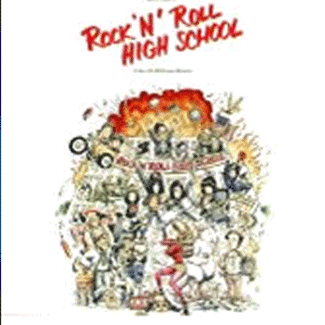
For an album with a saccharine title, this movie packs an incredible kick, but of course — it has the Ramones in it! Alan Arkush, working for sleazy producer Roger Corman, directed Mary Woronow in the role of Miss Togar, the new principal of Vince Lombardi High, facing her off against PJ Soles as Riff Randell, the Ramones’ Number One Fan, or as Miss Togar would have it, “a spoiled teenage heathen punk”. According to Arkush, the production was completed for $280,000, operating within Roger Corman’s stingy budget, by finessing all rules, including fire safety and noise laws, and any other rule not enforced by the Director’s Guild, Actor’s Guild, or Writer’s Guild. The guiding vision was Corman’s desire to blow up the school at the end using real explosions, but Corman’s big kaboom is put into the shade by the truly explosive Ramones concert footage.
The plot can’t lose any power by being revealed, because it is no plot, just a stretched rubber band of teenage eroticism, yearning, and rebellion pulled to the breaking point and then allowed to snap. Riff is single-mindedly devoted to Joey, whom she likens to “a poem” while sharing romantic confidences with her friend Kate Rambeau, the school genius. Kate pines after the top jock, Tom, played by Vince Van Patten, who isn’t attracted to her, and instead buys a “contract” for Riff’s affections from the school’s budding sleazebag, Eaglebauer, who hosts Lombardi High’s black market from a secret office in the smoke-filled Boy’s Room. The contract comes complete with a training makeout session in front of a roll-down screen of a romantic LA night in the full light of day in Topanga Canyon, an experience that leaves Tom feeling high and dry when confronted with a convertible, the city-lights backdrop, and a willing Kate as his “training partner.” But enough distraction, back to the film.
Riff has to attend the concert at all costs, so she takes her sleeping bag, chaise lounge, and thermos out to a location that Angelenos will recognize as the Mayan Theatre in downtown LA, where she camps out at the box office with her cardboard cutouts of the Ramones. Meanwhile, Kate backs Riff up with forged notes for missing school that serially announce the deaths of Riff’s mother, father, and finally, her goldfish. “They say these things happen in threes,” explains Kate. Out on the front lines, Riff learns a lesson about the tough side of rock and roll, when demonic groupy “Angel Dust” cuts into line in front of her, mocking Riff’s 72 hours of devotion and her wardrobe before telling Riff to “put it where the monkey puts the nut.” This retort stymies Riff into bemusement that is abruptly shattered by the military stamp of Johnny slamming out the opening chords of I Just Wanna Have Somethin’ To Do. This sonic detonation heralds the screen arrival of the boys in a vermillion-colored 1958 Cadillac convertible, bearing a license plate that reads “GABBA-GABBA-HEY.” Joey is sitting like a king on the trunk, his long legs planted in the back seat, eating a chicken leg that he gaily throws away with a careless toss. When the car stops, the Ramones clamber out like soldiers getting out of a truck. Arkush says the Ramones were not very comprehending of the concept of acting, and that’s their charm. They’re not acting. They’re being Ramones, a group of guys who were lovable particularly because of their simplicity. Arkush wisely also exploited the local rock scene to dredge up fanatical scenesters willing to pay to be in a Ramones movie, working up to a 22-hour marathon concert at the Roxy that rotated three casts of audience extras to rock out to the same songs repeatedly through take after take, until their patience was exhausted and another audience would replace them.
Despite the run-in with Angel Dust, Riff gets tickets for herself and all of her friends at school. Riff even gives a spare ticket to the proto-beatnik music teacher, Mr. McGreedy, who asks Riff when presented with the ticket, “What are Ramonees?” Miss Togar is less good humored about Riff’s prolonged absence from school, particularly because Riff’s final excuse involving the goldfish has been conclusively proven false, stimulating some Belushi-style sushi consumption by one of Miss Togar’s Hitler Youth hall monitors. Miss Togar then directs the hall monitors, eager to conduct a body search, to confiscate the girls’ tickets, leaving them a bit disheveled, and entirely bummed. Fortunately, Joey comes to sweetly console Riff in her room after she puts on a record and fires up a joint, a little vignette that even includes a shower scene displaying PJ’s really skinny back.
Another great scene, that gets innocently sexy, is when Riff takes over gym class to give a musical lecture about Rock and Roll High School, while the hall monitors spy on the class with evident pleasure. Meanwhile, over in the science lab, Miss Togar continues her mind control campaign, trying to explain to Mr. McGreedy and the gym teacher that rock and roll is truly dangerous. She begins with a poster-board presentation on how she has induced socially disruptive traits such as insomnia, musical indulgence, and a higher incidence of casual sex in white rats simply by experimentally exposing them to rock and roll. With respect to the clear and present danger of the Ramones concert in particular, Miss Togar explains that through testing with her Rock-o-Meter, a device for measuring “relative rock and roll intensity,” she has established that Ramones music exceeds all other rock music in intensity. After testing out the Rock-o-Meter, she directs her observers to don protective earmuffs, places a helpless rat in an aquarium, and cranks up the volume on Lobotomy. The hapless rodent spontaneously detonates.
On the testosterone beat, Eagleabauer keeps working his plan to achieve the seduction of Riff for the benefit of Tom, procuring the “Warlock,” a latter-day Cro-Magnon love nest on wheels, all bad taste and glitter, embodying the masculine myth that women melt when confronted with a display of excess. Plying Tom with hard liquor, Eaglebauer triumphantly conducts his final strategy session with Tom in the van, assuring him that now that Riff has no tickets, she will naturally come to him. Riff, however, is protected from such crude designs upon her affections by her pure love of the Ramones. When Tom calls Riff to ask for a date, with Eaglebauer coaching from a large prompt-sheet, Riff accepts, planning to slip him to Kate, who will easily take Tom over the Ramones. Then, fate takes a twist as Screamin’ Steve takes to the air to announce a Ramones concert giveaway, two tickets for the first person who can recognize the name of the tune, which is right on the tip of Riff’s tongue, causing automotive recklessness and other mayhem to occur as Riff overcomes all obstacles to be the first caller to shout “Questioningly!” The girls are going to the concert, but when they break the news to Tom, he’s a bit put out. When Tom decides to drown his sorrows, though, Eaglebauer won’t hear of it, exhorting Tom that love conquers all, and worse, if Tom doesn’t get what he paid for, he’d be entitled to a refund.
For me, who had never been to a Ramones concert, Rock and Roll High School was a lesson I had to study, preparing for that moment when I would actually attend a show. Arkush cameos as the doorman in this screen cap, admitting one large rodent (with earmuffs). Arkush’s cutting of that 22 hours of concert footage perfectly captured the pacing of a Ramones show, which in all my experiences, never varied at all. Every concert started abruptly, without introduction or chitchat. The kids came to hear music – let’s get to it. Every song followed after that with no breaks. When it was over, they’d do one, two, three encores. Then it was over, and you were listening to that big movie-western score by Kitaro, playing through the sound system, and you were back to reality, among the freaks, the leather and stud people, the edge people, of which you are one. Outside, it was usual in LA to find a deployment of fifty to a hundred police waiting for you in the paring lot at the conclusion of every Ramones concert, just to see if they could prod some adolescent into doing something stupid.
I Believe In Miracles became part of the Ramones repertoire long after Rock and Roll High School was produced, but for those of us who needed miracles back in the eighties and nineties, the film was proof that some miracles occur. A movie can be made about punk rock with humor. True love can conquer all. The school authorities can be defeated. Kate and Tom really are meant for each other, and are united in a blissful moment at the foot of the stairwell, as an honor guard of big-hipped cheerleaders high-step down the stairs as Do You Wanna Dance slips into gear, a three-bar wind-up before Joey pops the clutch with his voice and launches the melody, a happy, childish playground lyric of bright tones against the metallic blur of Johnny’s guitar.
Do you wanna dance and hold my hand?
Tell me baby I’m your lovin’ man,
Oh baby, do you wanna dance?
This could have been the joyful climax of the film, but Roger Corman had that one stipulation – that the school be blown up. So Riff enlists the Ramones in her campaign of destruction, locking herself and her fellow-rebels into the administration office, chainsawing the files, throwing school desks and the hall monitors out the upper windows, and engaging the police in a life or death confrontation that receives on the spot coverage from “Screamin’ Steve,” the radio host with the red suit in front of the police car, in case you couldn’t see him. Kate, who has spent a lot of time “splitting protons in the basement,” according to her mom, thus blossoms into a pyrotechnic expert, one-upping the police decisively by detonating the entire institution. Arkush says the explosion actually was five-times as big as intended, due to a miscalculation of the right amount of naphthalene to use for the job, due to changing atmospheric conditions. Bullshit. Those special effects guys know there’s more risk of not getting paid if your bomb is too small, and the shot is a dud, than if your bomb is a bit too big, and scares the actors. Of course if it is so big that it knocks down a helicopter, which decapitates Rod Steiger and a couple of little kids while filming a Twilight Zone episode, you probably get a lot of shit for that. You might end up on worker’s comp, sidelined with “stress.”
The Magic & Mystery of Punk Rock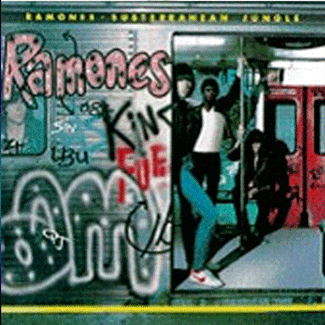
I became a lawyer as my only way out of poverty. My legal education was a gigantic process of running up debt to acquire mental capital, a huge gamble on the adequacy of my intelligence. I had invested three years of my life, and my wife’s life, in becoming a lawyer. It was getting to be time to show my hand, and I was terrified. The image of Evel Knievel leaping the Grand Canyon persistently came to mind.
Fortunately The Ramones were there to give me a boost across the scary gulf between being a law graduate and being a practicing lawyer. My anxiety was omnipresent, but again and again I cut through it by plugging into the sound, rocking out in my apartment, in my van with my boom box, on the beach with my headphones, conquering the LA misery, cutting it down with the scythe of purest metal, healing the hurt with heartfelt vocals. With the innocence of Ramones music strengthening me, I faced up to the reams of legal formulas, melding my mind with the rules, performing the ritual that must be performed to don the advocate’s robe. As the fateful three days of the California bar exam approached, Robin and I armored ourselves with magic. She bought two shirts that we each agreed to wear for all three days of the exam, with GABBA-GABBA-HEY! printed across the chest. I was so stoked when she pulled those out. Then, we tied three strips of black cotton cloth around our wrists, and agreed that we would cut one off at the end of each day of the exam. Since we were taking the exam in different cities, me in Pasadena, and she in Long Beach, these promises to ritualistically share the ordeal seemed especially important.
The songs I most listened to in those days were mostly drawn from Too Tough To Die, Pleasant Dreams, Leave Home, Rock N Roll High School, End of the Century, and Subterranean Jungle. Leave Home in particular we listened the hell out of, with Gimme Gimme Shock Treatment, Oh Oh I Love Her So, Pinhead, and California Sun being among the top picks. One day I heard She’s The One on the radio and just about died. It ruled number one in my heart as favorite Ramones song for about two years. You could charm me like a cobra just by playing that song. Robin loved Needles and Pins, and I was crazy about I Want You Around, especially remembering Riff Randall in the movie, looking all dreamy in red lingerie while Joey sang her the song right there in her bedroom. I loved the saccharine sweet melody of Danny Says, and kept trying to figure out what the hell was going on at 53rd & Third. My kids and Tara, my wife, loved Rock N Roll High School, and we would all go wild over the scene where Joey and the boys ride up the street in an orange Cadillac convertible, to the irresistible beat of I Just Wanna Have Somethin’ To Do. But of course even that is topped by the climactic scene where the nerd and geek fall in love as the entire cheerleader squad comes marching down the stairs backed by live Ramones playing Do You Wanna Dance? Yes, yes, that’s the answer. We want to DANCE!
My Iron Maiden
The year 1987 was a difficult one for many people, no doubt, but for me it was particularly challenging. We moved out of student housing into a little house on the corner of Sixteenth and Bay Streets in Santa Monica, right across from the parking garage, which made it quite a noisy location due to the prevalence of car alarms going off every time of day and night. During the weekdays, I was trapped in what was then called the AT&T tower, working in the LA office of Morgan, Lewis & Bockius, an old Philadelphia firm. I spent every day with rich straight guys, and their sons and daughters, working to pay off my great big fat student loans. How I had gotten in there was a mystery to some.
The truth was, I was hired by the litigators, a crew of very cool lawyers, Vickie Bonnebaker, Steve Lowry, Gary Russo, Jim Wawro, and Gayle Crosby, some of whom are still working together. They were the core of the original LA litigation office, and they understood me, but in the larger firm, I did not fit in. One day my friend, senior associate Robert Maas, told me that he had been walking with two partners, Loyd Derby and Chuck Cale, when they walked past the place where my red Honda Ascot was parked, and Chuck said to Loyd, “Do you know, Loyd, that one of our associates rides a motorcycle to work?” That was Charles Carreon, Robert had volunteered. Once, when Mike Klowden, the LA managing partner, took all the new associates to lunch at the Athletic Club, I wore what I thought was a snazzy contrasting combo, a dark blazer with beige pants. I realized I had missed the mark when one of the new corporate guys did a sort of black act, like I was dressed like a jazz musician in flashy attire, to the quiet amusement of a couple of the corporate female attorneys.
Although I had no money in the stock market, the crash of October 19th, when the New York stock exchange lost over 22 percent of its value in one day, set downtown LA reeling. Later, when the Boesky prosecution made famous in Den of Thieves took off, the firm I worked for represented Boyd Jeffries, LA financial magnate and owner of Jeffries Banknote Company, who ratted out Ivan Boesky and his pet Michael Levine. I killed time in the library trying to figure out what the hell I was supposed to be doing. One day Loyd Derby gave me a complaint and told me to draft an answer. I had no idea what the hell a complaint was, and read the thing. It said that a Mexican couple had taken their baby to LA County Hospital because it was sick, and then they never got the baby back. The baby just disappeared, and County told them that the baby had died, but they’d lost the body, and yet there was no proof of that. Horror of horrors. I couldn’t believe we represented the County. I had not thought to receive this kind of work at ML&B. I had a bad dream that there was a pile of dead babies in my back yard. The next day Loyd came and told me to stop work on the project. It had been a mistake. We didn’t do that sort of thing for that client. I felt like a death sentence had been commuted.
I had passed the bar exam with relative ease, but with that de riguer achievement safely secured, I realized that I had been cast out of the heaven of academia for a long, long time to come. I found myself confused and anxious about the future of my life. Riding my motorcycle or the bus fifteen miles from Santa Monica to LA and back every day was a bit of a grind, especially wearing a business suit. The whole thing was really so crazy I was in a constant state of amazement and anxiety. What the hell was I doing here? There was a JESUS SAVES sign on top of the building right next door to our office building, and a televangelist held church every Sunday in the building. His trashy flock would park their rattletraps in the building lot, to be ridiculed by the young lawyers in our firm. It was pitiless company, a humorless grind, although it was also very collegial, whatever that means. I was a prisoner, a brain slave of the corporate hegemony, just another salaryman, and not a very clever one at that.
Halfway to Sanity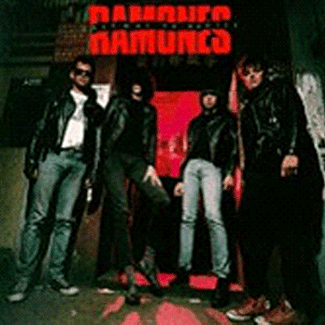
Fortunately, in 1987, Halfway To Sanity came out, saving what was left of my own crippled self-image. This album was the first to feature Richie on drums, a harder metal edge in Johnny’s guitar, and Joey at the peak of his energy. The album was a thrill from the opening song, I Wanna Live, a driving anthem, of which a superb video is available on Lifestyles of the Ramones, featuring Joey unhesitatingly launching himself onto the packed crowd, his long, gawky legs flying free in space as a crowd of reverent arms received him. On top of that crowd of sweating, tattooed, razorback punks, he was safe as a baby in his mother’s arms. Love is a strange thing.
Sounds like Bop ‘til You Drop were the reason why we loved the Ramones:
“Stick ‘em up,
Give me your money.
You act like a big shot but
You’re really a dummy.
They want your blood,
They want every drop,
Bop ‘til you drop,
Bop ‘til you drop.
Now that Joey, Johnny and Dee Dee have departed this earth, we can fully understand exactly what they were talking about. They bopped until they dropped in the service of their fans. They certainly didn’t let up the pace on Halfway to Sanity, apparently hoping that with enough drive, they might make it all the way there. Still, there are a few weak links in the chain. The Garden of Serenity lacks a single original lyric, and frankly sounds like an ironic makeover of most of the metalhead bands who inhabited the twilight of hard rock as it caved in under a relentless assault from the Big Three: Michael Jackson, Madonna, and Bruce Springsteen. The Garden of Serenity has only two things to recommend it – the mad-horseback-ride-into-darkness beat and the pidgin-Latin chanting in the background. Thematically, this song is paired with I’m Not Jesus, an epic of self-flagellation that will make nearly any straight person wince and grimace simultaneously. Great stuff for getting rid of unwanted visitors, like pedophile priests and their apologists.
Weasel Face is a quick headbang against the brick wall of urban reality, here and gone quick, like modern life itself. Go Lil’ Camaro Go can’t compare with Surfin’ Bird from Rocket to Russia, but it gives you a chance to catch your breath before you regress to age fourteen during I Know Better Now, a superb rant-along that can exorcise a full day of urban frustration in a few minutes.
“When I was your age
I heard it all
Like livin’ under
Your martial law.
I’m not a criminal
I’m not on drugs,
Don’t wait up for me
I’m out havin’ fun.
I’ll admit it was for my own good
I’ll agree it was true,
But no-body
Can tell me
I know
I know better now.”
Once you’ve achieved that release, slide into A Real Cool Time, a hip shaker with a rhythm that invites full frontal display, and lyrics that teach you cool pickup lines:
“When I saw you at the Cat Club
You looked really kind of cool now
Well come along with me ’cause
We got a lot of things to do now…”
Keeping Richie in harness, The Ramones cranked out another couple of kickass albums – Animal Boy and Brain Drain – both of which made it clear that they had answered the metal threat presented by Metallica, Black Sabbath, Iron Maiden, and their disciples. Joey started looking a bit more like a rock star, wearing leather pants like Jim Morrison, looking a bit less like a street urchin, a little more coiffed and styled at the photo shoots. But Joey’s smile stayed genuine, and the music got better and better, keeping up with the times, staying current with the issues that we were facing.
When I heard Bonzo Goes to Bitburg on Animal Boy, I was really happy, because it proved that the political edge we heard on “Too Tough To Die” was something that was there for good. This song recently got some bigscreen exposure when it served as the soundtrack for a montage of gonzo underage rocking in “School of Rock.” But the song is not at all cheery, and is actually a deep reflection on lying politicians and the excuses they make for the inexcusable. The song starts eerily with the puffing sound of a train pulling into a station as a rhythmic bell sounds out the departure for where, let me guess … then Johnny and DeeDee attack their instruments and that train takes off like a motherfucker headed straight for hell, and Joey jumps on at the last second, starting with an accusing shout straight at the Gipper:
You’ve got to pick up the pieces
C’mon, sort your trash
You better pull yourself back together
Maybe you’ve got too much cash
Better call, call the law
When you gonna turn yourself in? Yeah
You’re a politician
Don’t become one of Hitler’s children
Bonzo goes to Bitburg then goes out for a cup of tea
As I watched it on TV somehow it really bothered me
Drank in all the bars in town for an extended foreign policy
Pick up the pieces
My brain is hanging upside down
I need something to slow me down
Shouldn’t wish you happiness, wish her the very best
Fifty thousand dollar dress
Shaking hands with your highness
See through you like cellophane
You watch the world complain, but you do it anyway
Who am I, am I to say
Bonzo goes to Bitburg then goes out for a cup of tea
As I watched it on TV somehow it really bothered me
Drank in all the bars in town for an extended foreign policy
Pick up the pieces
My brain is hanging upside down
I need something to slow me down
If there’s one thing that makes me sick
It’s when someone tries to hide behind politics
I wish that time could go by fast
Somehow they manage to make it last
My brain is hanging upside down
I need something to slow me down


